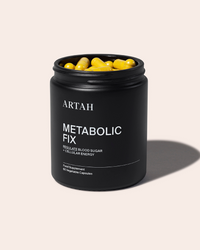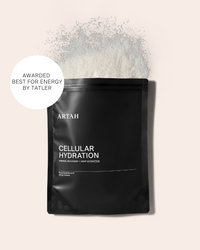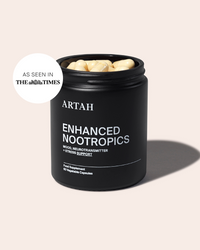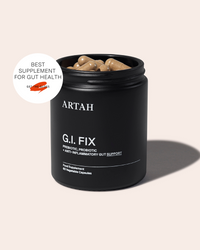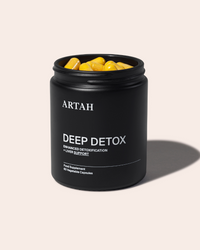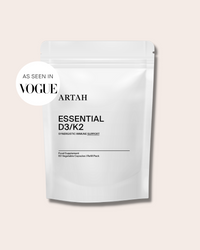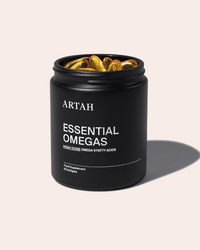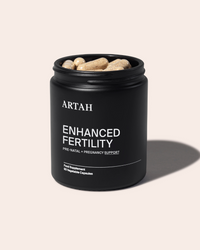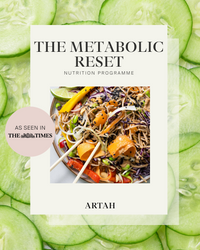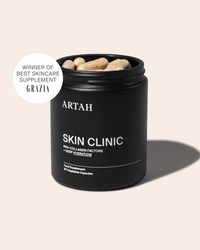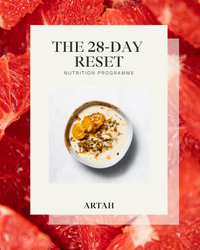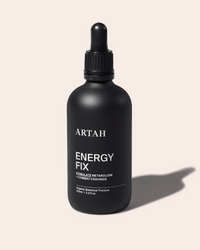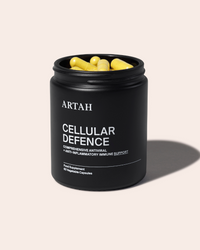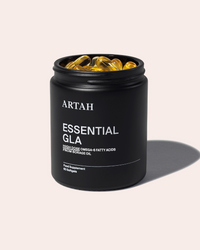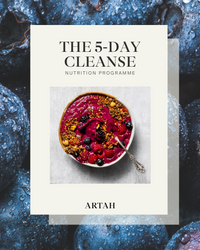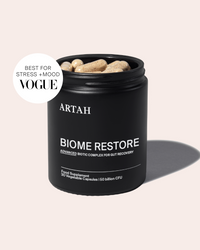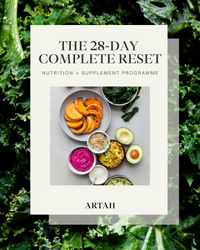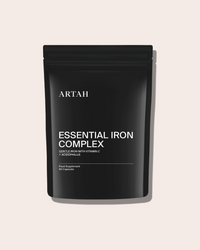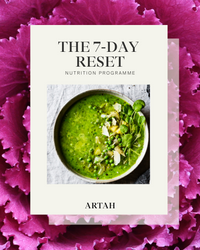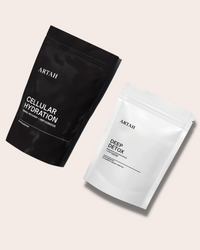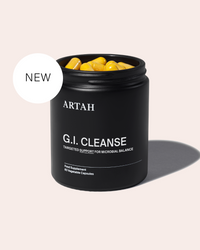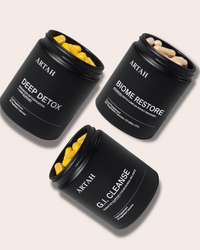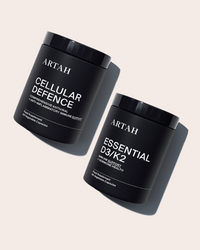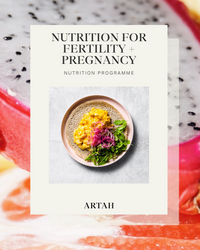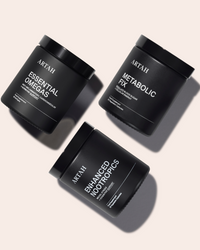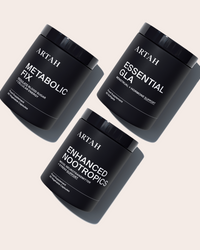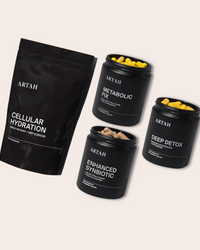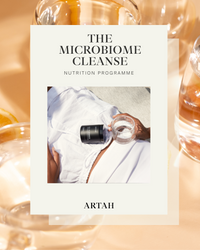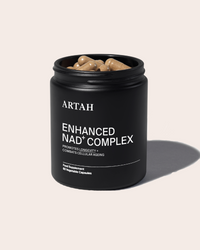DO YOU HAVE DYSBIOSIS?
Why so many symptoms are linked to your gut.
Bloating, constipation, reflux, frequent trips to the bathroom, and excess wind are some of the more obvious signs that our gut is unhappy. But what if I told you that poor gut health can encompass so much more? Fatigue, brain fog, hormone imbalances, skin conditions, chronic UTIs, impaired immunity, and poor blood sugar control can all be manifestations of an imbalanced gut. What’s more, we now know that the bacteria in our microbiome influence a host of disease states, including obesity, diabetes, cancer, cardiovascular disease, asthma, allergies, depression, Alzheimer’s, autoimmunity and more. (1)
How can one thing influence so many aspects of our health? Well, our microbiome is vast; the populations of bacteria, viruses, and fungi together far outnumber our human cells. Whilst these microorganisms can be found across various parts of our body, think of the gut as their hub. The microbiome and its metabolites influence digestion, absorption, and bowel health, and they also direct endocrine, immune, and metabolic processes, making it an important focal point of for those not only suffering from chronic symptoms, but also those looking to improve their longevity, well-being, and resilience to disease.
DYSBIOSIS – AN EMERGING TREND IN HEALTH
Our microbiome is an ecosystem of microbial species that work together to maintain health. Both beneficial and harmful microbes are present all the time, so when it comes to a healthy microbiome, balance and diversity are key. We want to have enough of the good guys to keep us on track. When the balance of harmful and beneficial microbes is upset, we can experience a disruption in various aspects of our health; in simple terms, the bad bugs outnumber the good, causing all sorts of problems. This imbalance is known as dysbiosis, and its consequences can be seen across the entirety of our health. Dysbiosis can occur from an overgrowth of harmful bacteria, a loss of beneficial bacteria, or a loss of diversity of bacteria, and there are a variety of ways it can manifest. Here are some of the more common types of dysbiosis that you may have heard of.
CANDIDA
Candida albicans is a normal yeast that’s present in the body. When we are balanced and healthy it doesn't cause illness, however when it grows in excess, it can cause things like recurrent vaginal yeast infections, mouth thrush, fatigue, lack of focus, mood and digestive disruptions, and in severe cases, systemic candidiasis. Factors that increase the risk of candida overgrowth include antibiotic use, hormonal contraceptives, steroid use, overuse of NSAIDS, excess refined carbohydrates and sugar in diet, excess stress, unmanaged diabetes, weakened immunity, and irritation from lubricants, clothing and detergents; however, it usually occurs when a combination of factors are present.
SIBO
SIBO stands for small intestinal bacterial overgrowth and refers to a condition when there is excessive bacteria or microbes in the small intestine. The small intestine should be relatively free of bacteria, and one of the most important factors to keeping this status quo is the Migrating Motor Complex (MMC); our body’s natural cleaning waves, where bacteria and food are moved through the digestive system to the colon. When this is disrupted, bacteria can take residence in the small intestine where they don’t belong, causing symptoms like abdominal pain and distention, an uncomfortable feeling of fullness, bloating, nausea, acid reflux, diarrhoea, unintentional weight loss and more. Like Candida, it can also cause a variety of symptoms relating to our mental health, including anxiety, brain fog, and excess stress. It can be caused by a variety of factors including chronic stress, excess carbohydrates and sugar, lack of fibre, uncontrolled diabetes, IBS, recurrent antibiotic use and more.
LACK OF DIVERSITY
Symptoms of bacterial dysbiosis aren’t limited to the gut, and some of the more common symptoms associated with a general loss of diversity may not be the first thing you think of when you consider gut health. Dysbiosis is commonly linked to impaired gut barrier function, inflammation, and an exacerbated immune response, which is why symptoms like fatigue, brain fog, skin problems (acne, rashes and eczema), anxiety, poor metabolic control, altered immunity and depression can all be signs of an imbalanced microbiome.
TACKLING DYSBIOSIS
The good news is this; our microbiome can respond positively to changes in as little as a few days, and our enterocytes – the cells that line our intestinal tract – can start to regenerate after one week. Although the severity of the imbalance will dictate how long it takes to resolve, you can be confident that targeted changes to lifestyle and diet can start working quickly. Here’s what to do:
Nutrition: Too much sugar, ultra processed food, and a lack of fibre is the trifecta of dysbiosis from a dietary point of view. Focus on reducing sugar and refined carbohydrates, swapping to whole foods, and increasing plant diversity in the diet. Snacking can also worsen dysbiotic symptoms, especially for those with SIBO. The MMC is activated in periods of fasting, so we need about 3-4 hours between meals for it to do its job. If we’re constantly snacking – even on foods we perceive as healthy – it can slow transit time in the gut, making it a breeding ground for unhealthy bacteria. If you already have - or suspect you have - SIBO, a low fermentation, low FODMAP nutrition intervention, like The Microbiome Cleanse, can help reduce symptoms quickly whilst you work on a return to balance.
Lifestyle: Chronic stress has a strong influence on gut health. It can increase the expression of opportunistic bacteria, reduce digestive secretions, and alter the movement of the gut (MMC). It can also disrupt communication in the gut-brain axis, which perpetuates the cycle; inflammation in the gut feeds back to the brain to increase stress, and the perception of stress feeds back to the gut to increase inflammation and slow digestion. Try to make stress reduction techniques like breathwork or mindfulness a consistent part of your routine - this is important for gut health, but will benefit every aspect of your wellbeing.
Supplements: Supplements are key to the resolution of dysbiosis because the harmful bacteria need to be addressed with effective, targeted antimicrobials. In fact, research has shown that antimicrobial herbs have been shown to be as effective at treating SIBO overgrowth as Rifaximin, the antibiotic used for SIBO treatment, and without the negative side effects. (2) GI Cleanse uses these antimicrobials to help you get rid of harmful bacteria while promoting the growth of beneficial bacteria. It includes Capryllic Acid, Grapefruit Seed Extract, Berberine, Black Walnut Hull, Pau D’arco, Thyme, Cloves and Black Garlic Extract for powerful antibacterial, anti-fungal, and anti-inflammatory microbiome support.
The Microbiome Cleanse: If you suffer from chronic symptoms and need extra support, our new nutrition programme, The Microbiome Cleanse, has been designed to help you remove harmful bacteria, repair your gut, and restore function. It has two levels to choose from:
LEVEL ONE - 14 days
This is the basic level and is perfect for anyone looking to cleanse and reinvigorate their digestive system, but who isn’t necessarily suffering from a chronic digestive issue or systemic fatigue. It’s the best choice for you if you:
- Experience occasional or regular GI discomfort, but do not have IBS, SIBO, or chronic symptoms
- Have been eating and drinking more than usual and your gut feels off
- Feel sluggish
- Often eat sugar and ultra processed foods
- Would like to target fat loss and give your metabolism a boost
- Have taken antibiotics and/or had a stomach virus more than once or more in the last 2 years
- Have read through the Level Two protocol, and decided it feels unnecessary considering your current health state
- Want to take a proactive approach to enhancing the health of your microbiome
LEVEL TWO - 28 days
This protocol is more comprehensive and is designed for those suffering from chronic gut issues and/or systemic symptoms like fatigue, skin problems, and poor metabolic control. It is the best choice for you if you:
- Experience ongoing gut discomfort or have IBS/dysbiosis/SIBO
- Feel constantly fatigued, foggy, and/or often describe feeling ‘toxic’
- Have taken repeated courses of antibiotics in the last 2 years or have ever taken a prolonged course of antibiotics at any time (1 month or more)
- Rely heavily on sugar and ultra processed food throughout the week
- Have a diet is extremely low in fibre
- Have intense sugar cravings that are difficult to combat despite trying
- Feel like you gain weight too easily, despite healthy eating and exercise
It includes our new Gut Recovery Set (GI Cleanse, Biome Restore + Deep Detox) alongside a nutrition eBook with the protocol, over 60 low fermentation recipes, and all the knowledge you need to understand the complex science of gut health. You'll also have 30 days of complimentary access to ALLEZ, a digital movement platform where you can access yoga and breathwork classes as a part of your programme.
References:
-
Man and the Microbiome: A New Theory of Everything? Mary I. Butler, John F. Cry, Dan, Timothy G. Dinan. Annual Review of Clinical Psychology 2019 15:1, 371-398
-
Chedid V, Dhalla S, Clarke JO, Roland BC, Dunbar KB, Koh J, Justino E, Tomakin E, Mullin GE. Herbal therapy is equivalent to rifaximin for the treatment of small intestinal bacterial overgrowth. Glob Adv Health Med. 2014 May;3(3):16-24. doi: 10.7453/gahmj.2014.019. PMID: 24891990; PMCID: PMC4030608.






